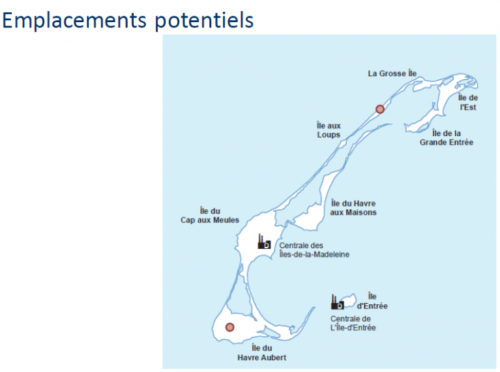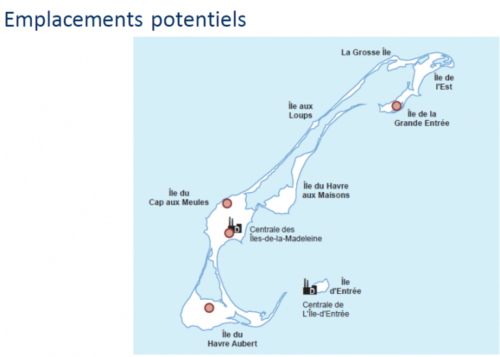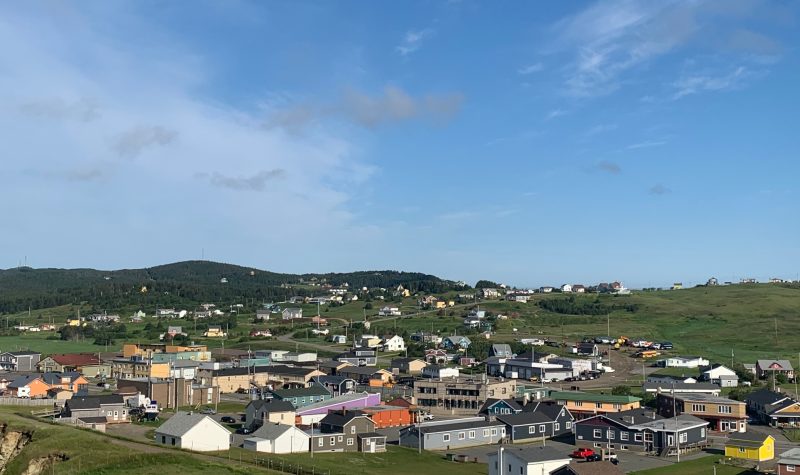Magdalen Islanders will receive an invitation by mail to participate in Hydro-Québec's consultation on the archipelago's energy transition. The upcoming consultation will take place by telephone or through an interactive digital platform.
Hydro-Québec said it still favours connecting the Islands to its integrated network on the mainland by means of a submarine cable. But the Crown corporation is anxious to get the pulse of the population, since "social acceptability" is one of the four basic criteria that will guide its choice for the transition.
Connection by submarine cable
The preliminary results of the draft-design study for the connection announced in 2018 have demonstrated higher costs than initially anticipated. Hydro-Québec has proceeded with an analysis of alternative options likely to reduce the ecological footprint related to energy production in the Islands.
Spokesperson Geneviève Cloutier said that Hydro Québec is studying the feasibility of connecting the archipelago to one of the Maritime provinces by submarine cable, rather than to the Gaspé Peninsula, in order to reduce costs.
Here is Cloutier speaking to the issue (in French):
New wind turbines
Another option proposes to install up to eight new wind turbines on the Islands, higher than the two currently being assembled.
To achieve this, Hydro-Québec has targeted two potentially compliant sites. The first is on the Bassin side of Havre-Aubert Island, and the second is near the Dune-du Nord wind farm, despite the presence of a protected floral habitat.

source: Hydro Quebec
If this option were retained, the new wind turbines would produce 40 megawatts per year, the equivalent of 50 per cent of the energy currently produced by the Cap-aux-Meules Thermal Power Plant, according to Hydro-Québec. This would be added to the 15 per cent that will already be saved thanks to the two Dune-du-Nord wind turbines and storage batteries.
However, the Thermal Power Plant would be maintained in order to maintain a guarantee of supply for all the Magdalenian households.
Solar panels
The idea of solar panels is also on the table.
But a centralized park should cover an area equivalent to 35 soccer fields, according to Hydro-Québec. This will ensure an output equivalent to 5 per cent of the plant's current production capacity, given the variation in sunshine periods throughout the year, even with the integration of storage technology.

A map illustrating the new areas of potential solar panels. Photo courtesy of Hydro Quebec.
Cloutier added that following the municipal consultation in September on the Maritime Community Energy Strategy, the idea of installing residential solar panels is being considered and that Hydro-Québec is studying the best way to support this practice.
It would still be a back-up supply measure rather than a means of converting the thermal power plant.
Combustion of forest biomass
Citizens will also be able to express their opinion on the combustion of forest biomass from wood pellets, which would reduce greenhouse gas emissions in the Islands by 85 per cent, the crown corporation suggested.
However, the supply difficulties have to be considered, since the volume of fuel would far surpass the 40 million liters of fuel oil per year that currently feeds the plant. There's also the logistics of disposing of the residual ashes to consider.
Conversion of the plant to natural gas
This option would necessarily require the construction of a brand new power plant that would operate essentially on steam.
Next comes the conversion of the plant's engines to liquefied natural gas, which would be supplied by cryogenic containers delivered by ship and then by truck trailer to the plant's tanks, according to Hydro-Québec.
The environmental gains then represent a 35 per cent reduction in GHGs, without however calculating the emissions related to transportation by boat, which will be considered in a later phase of Hydro-Québec's analysis.
This option requires a major adaptation of the current infrastructures.
Carbon neutral fuels
Finally, the Crown corporation is proposing the carbon neutral fuel pathway, which refers to GHG emissions equal to, or less than, the natural or alternative combustion of materials such as compostable waste or methane.
Supply from hydrogen combustion also falls into this category.
Cloutier explains that these forms of supply are still emerging and will not be exploited to ensure the energy supply of the Magdalen Islands for several years.

Hydro-Québec Spokesperson, Geneviève Cloutier
But the idea is still being considered, since the Crown corporation's transition plan extends over a 40-year horizon. While waiting for the development of the carbon-neutral sector, Cloutier said options could be put forward with the idea of creating an energy mix for the Islands that, in the long term, could completely eradicate GHG emissions related to the archipelago's energy production.
Here is Cloutier speaking to the issue (in French):
Next steps
The results of the consultation are expected in December.
The cost estimate for the connection project will then be presented at the time Hydro-Québec's proposal is filed with the Régie de l'Énergie for approval, which is scheduled for May 2021.
The Crown corporation will make its decision based on the reliability of the technologies that will ensure the supply of energy, the reduction of production costs, the environmental gains related to the reduction of GHGs, and public support for the chosen solution.
Beginning Thursday, citizens will have until Nov. 20 to consult the online information tools at www.conversation.hydroquebec.com/projet-idlm, where they can ask questions and make comments.
In addition, an independent firm will contact 750 Magdalen Islanders by telephone to ask them to answer a questionnaire.
The Cap-aux-Meules thermal power plant produces more than 125 thousand tonnes of GHGs per year.


